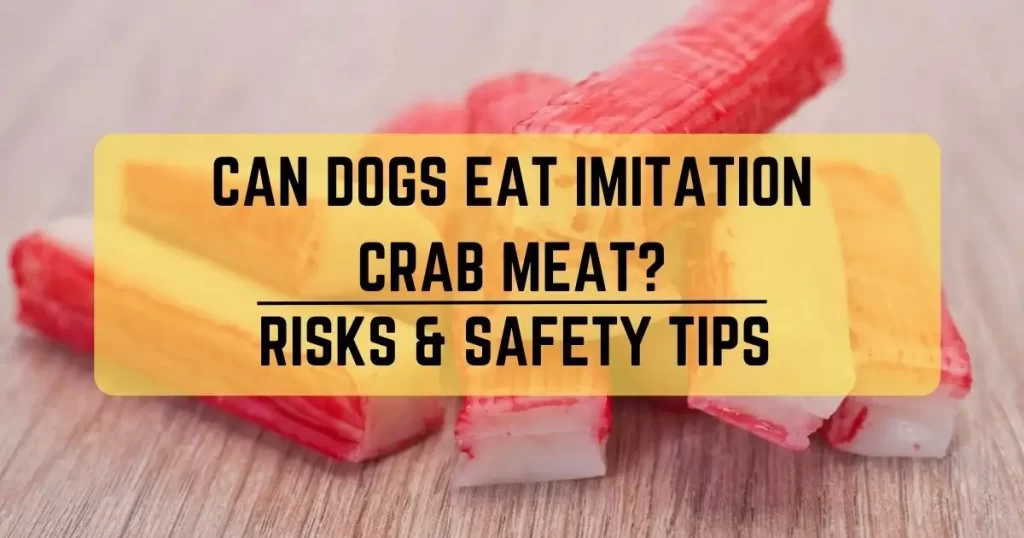
Attention dog owners! Are you wondering if it’s safe for your furry friend to indulge in the deliciousness of crab meat or imitation crab? Well, we’ve got the answers you need. Discover the truth about dogs eating crab meat and the risks involved. Find out if imitation crab sticks are a suitable treat for your canine companion.
But beware, there are hidden dangers lurking in those enticing seafood delicacies that could harm your beloved pet. Read on to uncover the facts, heed the warnings, and ensure your dog’s health and happiness.
Don’t wait another moment—learn what you need to know to make informed decisions for your four-legged friend’s well-being.
Crab Meat and Dogs
Crab meat is a delicious and popular seafood enjoyed by many humans, but what about our canine companions? Can dogs eat crab meat? While dogs can consume crab meat in moderation, there are certain considerations to keep in mind. Crab meat is a good source of protein and contains essential nutrients like omega-3 fatty acids, vitamin B12, and minerals such as zinc and copper. However, it’s important to remove the shells and any seasoning or spices before offering crab meat to your dog.
Additionally, some dogs may have allergies or sensitivities to seafood, so it’s crucial to introduce it gradually and monitor their reaction.
Dogs Eating Imitation Crab
Imitation crab, also known as crab stick or surimi, is a processed seafood product that mimics the taste and texture of crab meat. But can dogs eat imitation crab? While it may be tempting to share this savory treat with your furry friend, caution is advised. Imitation crab sticks often contain additives such as artificial food coloring, potassium chloride, and high sodium content, which can be harmful to dogs. These additives are not suitable for their digestive system and can lead to issues like upset stomach, dehydration, or even high blood pressure. It’s best to avoid feeding your dog imitation crab sticks and opt for safer alternatives.
Can Dogs Eat Crab Meat?
Yes, dogs can eat crab meat in moderation. Real crab meat, when properly prepared, can provide nutritional benefits for your dog. It is essential to offer only plain, cooked crab meat without any seasoning, spices, or added ingredients. The crab meat should be free from shells, as they can pose a choking hazard or cause injury to your dog’s digestive system.
As with any new food, it’s advisable to introduce crab meat gradually and observe your dog’s reaction. Some dogs may have allergies or sensitivities to seafood, so it’s crucial to monitor them for any signs of adverse reactions such as itching, vomiting, or diarrhea.
Risks of Feeding Dogs Crab Meat
While crab meat can be a nutritious addition to your dog’s diet, there are certain risks associated with feeding them this seafood. One potential concern is the presence of bacteria or parasites in raw or undercooked crab meat, which can lead to gastrointestinal issues in dogs.
Therefore, it is essential to cook the crab meat thoroughly before offering it to your furry friend. Another risk is the potential for allergies or sensitivities to seafood. Some dogs may experience allergic reactions to crab meat, which can manifest as itching, hives, swelling, or digestive problems. If you notice any adverse reactions, discontinue feeding crab meat and consult your veterinarian.
Imitation Crab Meat and Dogs
Imitation crab meat, although it may resemble the real thing, is not a suitable option for dogs. While it’s made from white fish and other ingredients, it undergoes a heavily processed manufacturing process and contains additives that can be harmful to dogs. Imitation crab meat often contains artificial food coloring, which serves no nutritional value and can potentially cause allergic reactions or other health issues for your dog.
Additionally, the high sodium content in imitation crab meat can lead to dehydration and other complications in dogs, especially those with pre-existing health conditions. It’s best to avoid giving your dog imitation crab meat and opt for healthier alternatives.
Feeding Dogs Imitation Crab Meat
Feeding your dog imitation crab meat is not recommended. The additives and high sodium content found in imitation crab meat can be harmful to dogs and lead to various health issues. Sodium, in particular, can strain your dog’s kidneys and contribute to the development of high blood pressure. The artificial food coloring used in imitation crab meat may also contain additives that are toxic to dogs.
Furthermore, the heavily processed nature of imitation crab meat can make it challenging for dogs to digest, potentially causing stomach upset, diarrhea, or other gastrointestinal problems. It’s best to prioritize your dog’s health and stick to feeding them foods specifically formulated for their dietary needs.
Crab Sticks and Dogs
Crab sticks, often made with imitation crab meat, should never be given to dogs. These processed seafood products are not suitable for canine consumption due to the additives and artificial ingredients they contain. Crab sticks often have a high sodium content, which can be detrimental to your dog’s health, especially if they already have underlying kidney or heart conditions.
Additionally, the artificial flavorings and colorings used in crab sticks can cause allergic reactions or digestive issues in dogs. To ensure your dog’s well-being, it’s crucial to avoid feeding them crab sticks and instead focus on providing them with safe and healthy dog-friendly treats.
Seafood and Dogs
Seafood, including crab meat, can be a nutritious addition to a dog’s diet when prepared and offered appropriately. However, it’s important to note that not all types of seafood are safe for dogs to consume. Some seafood, such as raw shellfish or fish that may contain parasites, can pose serious health risks to dogs. Additionally, certain fish species, such as salmon or trout, may contain high levels of mercury or other contaminants that can be harmful to your dog’s health.
Is Imitation Crab Meat Safe for Dogs?
No, imitation crab meat for dogs is not safe.. While it may resemble real crab meat, imitation crab meat is a highly processed product that contains additives, artificial food coloring, and high sodium content. These additives and artificial ingredients can be harmful to dogs and may lead to various health issues such as digestive problems, allergic reactions, or dehydration.
Dogs Eating Crab Sticks
Dogs should not be allowed to eat crab sticks. These processed seafood products often contain additives, artificial flavorings, and high levels of sodium, all of which can be harmful to your dog’s health. The high sodium content in crab sticks can lead to dehydration, kidney strain, or even contribute to the development of high blood pressure in dogs. Artificial flavorings and other additives used in crab sticks may also cause allergic reactions or digestive problems in some dogs. It’s crucial to prioritize your dog’s well-being and choose treats that are specifically made for dogs, offering them a safe and healthy alternative.
Considerations for Dog Owners
As a responsible dog owner, it’s essential to consider several factors when it comes to feeding your dog crab meat or any other seafood. First and foremost, it’s crucial to consult with your veterinarian before introducing any new foods to your dog’s diet, especially if they have pre-existing health conditions or known allergies.
Additionally, ensure that any crab meat or seafood you offer to your dog is properly cooked, free from seasoning or added ingredients, and served in moderation. Monitor your dog’s reaction after consuming crab meat and be aware of any signs of allergies or digestive issues. Lastly, always prioritize your dog’s overall balanced and nutritious diet, opting for dog-specific food and treats that meet their specific dietary needs.
Remember, the health and well-being of your furry friend should always be the top priority, and when it comes to feeding them crab meat or any other food, moderation, caution, and consultation with a veterinarian are key.

